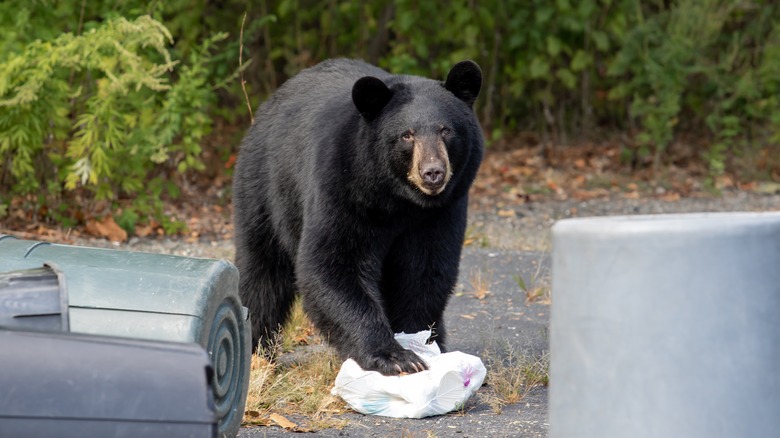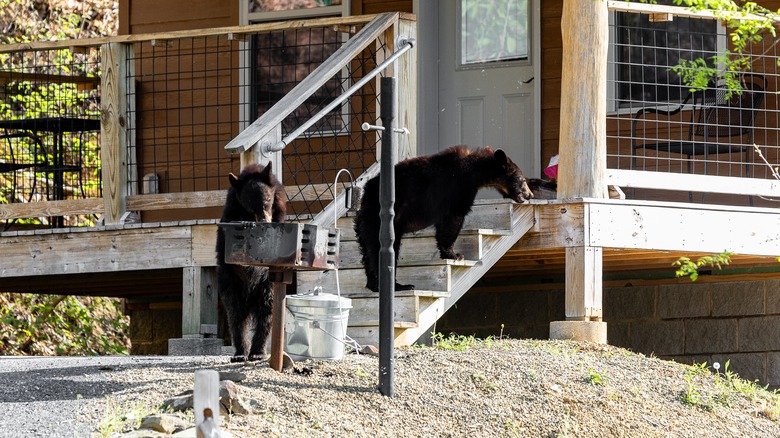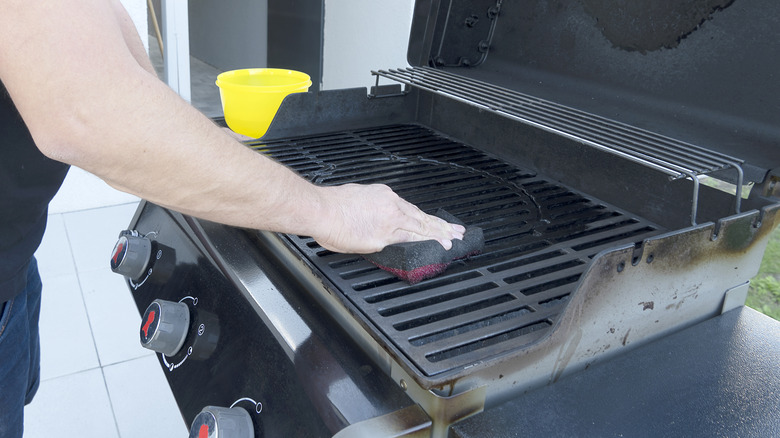Don't Delay This Summer Cleaning Chore Or Risk Bears Invading Your Backyard
It's no secret that bears have incredibly keen senses of smell. It's estimated that black bears and grizzly bears can smell a potential food source from as far as 20 miles away, while polar bears can smell food from a remarkable 40 miles away. While you may expect to see a bear out on a backcountry hike or camping trip, it's not unusual at all for them to wander into human civilizations, especially if they suspect there's a tasty snack in store. Keeping food and garbage locked away is one of the key ways to keep bears away from your yard, but there's one smelly item in your yard that's frequently overlooked: your barbecue grill.
Black bears aren't usually aggressive towards humans, and would much rather avoid an altercation with you than put up a fight, but they can become a neighborhood nuisance, presenting a threat to pets, breaking into garbage cans, and even damaging vehicles and other property. If you've been enjoying the summer season with a few backyard barbecues, it's crucial that you give your grill a thorough cleaning, especially before the summer ends. Here's how your grill could be acting like a dinner bell for bears and how to properly clean it to avoid attracting them to your yard.
Bears will invite themselves to your barbecue
While you're actively grilling outside, it's possible that you and your family make enough noise to keep bears at bay, but once you wrap up for the night and head indoors, your grill could become a tempting beacon. If you haven't been cleaning your grill immediately after cooking, it's only a matter of time until bears and other animals could show up in your yard. Because a dirty grill can be coated in caked-on fats and smelly residues, bears may be drawn to its meaty aroma, and it's not unheard of for bears to destroy grills or other property while sniffing around for crumbs.
Bears will also become defensive around food sources, especially if the food is rich in calories, like grilled meats. While bear attacks are rare, a defensive, hungry bear is not to be messed with. Cleaning your grill to avoid drawing bears is important in the summertime, especially toward the end of summer and into fall. As the fall season approaches, bears generally become less shy, and they're more likely to risk scavenging near humans, because they need to put on weight before winter. On average, an adult black bear needs to consume a whopping 20,000 calories per day in the fall!
Clean your grill properly to eliminate meaty aromas
For folks who don't live in bear country, a simple scrape and scrub may make your grill seem sufficiently clean, but if you share an environment with bears, you'll need to take some extra precautions. Immediately after cooking, burn off as much of the grease and residue as possible. Use a grill scraper, a pumice grill brick, or a sturdy grill brush to buff away any stuck-on residue, then remove the grate, if possible, to clean residue off the bottom of the grill. Remove the drip tray and dispose of any collected grease or burnt food crumbs in the trash — never pour it out in the yard or bury it.
After cleaning up the bulk of the gunk, you can get your grill as good as new with the help of a pressure washer or a thorough wash with unscented dish soap or homemade baking soda cleaner. For the latter, just make a paste of baking soda and water and use it to scrub the grill (don't forget to rinse after!) Wash the drip pan and wipe down the outside of the grill as well. When the grilling season is over, lock your grill up after cleaning it. A sturdy, locked storage shed or garage is usually the best place to keep your grill to avoid attracting bears. Be sure to follow other good bear-proofing habits — keep hungry bears out of your backyard bird feeder, don't leave pet food out, and secure smelly garbage cans in a garage.


